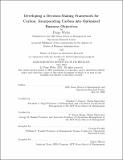Developing a Decision-Making Framework for Carbon: Incorporating Carbon into Optimized Business Objectives
Author(s)
Wyler, Paige
DownloadThesis PDF (2.809Mb)
Advisor
Graves, Stephen C.
Zheng, Y. Karen
Terms of use
Metadata
Show full item recordAbstract
Carbon emission reductions have been at the center of decision-making for companies across industries, particularly in automotive. As electric vehicles are introduced to the market, there is a large potential for reducing emissions associated with transportation. However, the process to build and use these vehicles is itself carbon intensive.
This thesis explores mechanisms to enable effective decision-making to meet carbon reduction goals. Carbon accounting is a new concept for most original equipment manufacturers, and they lack a framework for weighing the importance of carbon alongside competing business objectives. Additionally, most mechanisms used in other industries require a high level of data availability and knowledge management that may not exist in a dynamic, fast-growing company launching its first products.
In this thesis, we test carbon decision-making mechanisms in a high-growth business environment. A framework is developed for carbon decision-making, and the use of a carbon price is tested for specific business use cases by adding this cost to the objective function of a cost-optimized battery storage system. Using the results from these use cases, recommendations are made for applying carbon pricing to future decisions as knowledge management infrastructure evolves. This work provides a model for decision-making in a high-growth environment and creates clear conditions under which carbon pricing can effectively impact decisions.
Date issued
2022-05Department
Massachusetts Institute of Technology. Operations Research Center; Sloan School of ManagementPublisher
Massachusetts Institute of Technology